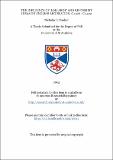Files in this item
The influence of 'Lollardy' and reformist ideas on English legislation, c.1376 - c.1422
Item metadata
| dc.contributor.advisor | Given-Wilson, Chris | |
| dc.contributor.author | Foulser, Nicholas E. | |
| dc.coverage.spatial | v, 348 p. | en_US |
| dc.date.accessioned | 2018-05-31T12:15:00Z | |
| dc.date.available | 2018-05-31T12:15:00Z | |
| dc.date.issued | 2005 | |
| dc.identifier.uri | https://hdl.handle.net/10023/13641 | |
| dc.description.abstract | This thesis explores the potential influence of 'Lollardy' and reformist ideas on English legislation in the period c.1376 to c.1422. It focuses on a comparison between the ideas expressed in a variety of Wycliffite works, most especially the tracts that were reportedly presented to parliament, and the ideas contained within parliamentary legislative activity. The aim of the thesis is to shed light on the extent to which the political community shared the ideas expressed in 'heterodox' works and the extent to which the debate over 'Lollardy' informed the debates over other issues within parliament. It begins with an introductory section which explores the nature of 'Lollardy', the potential of the parliamentary and statute rolls as sources for the impact of reformist ideas, and an examination of what can be gleaned from other sources as regards the attitudes of the political community to reform. It then moves on to explore legislative activity on a variety of issues including papal provisions, vagrancy, appropriation, non-residence and pluralism, hospitals and fraternal recruitment practices - on a primarily chapter by chapter basis, exploring the ideas and arguments as they developed chronologically and mapping these, as far as possible, against the known chronology of 'Lollardy'. It also makes comparisons between the petitions and the government's response, in order to determine the dynamics of 'Lollardy's' influence. Did the commons have an underlying programme of reform? If so, did this programme bear any relationship to the programme of reform advocated by the Wycliffites and the protagonists of disendowment? How committed were the commons to the ideas they espoused? Did the Church accept a level of parliamentary interference to stave off the threat of 'Lollardy'? What was the government's attitude to reform? These are some of the central questions of this thesis. | en_US |
| dc.language.iso | en | en_US |
| dc.publisher | University of St Andrews | |
| dc.subject.lcc | BX4901.3F7 | |
| dc.subject.lcsh | Lollards | |
| dc.subject.lcsh | Religion and politics--England--History | en |
| dc.subject.lcsh | England--Church history--1066-1485 | en |
| dc.subject.lcsh | Great Britain--Politics and government--1377-1399 | en |
| dc.subject.lcsh | Great Britain--Politics and government--1399-1485 | en |
| dc.title | The influence of 'Lollardy' and reformist ideas on English legislation, c.1376 - c.1422 | en_US |
| dc.type | Thesis | en_US |
| dc.type.qualificationlevel | Doctoral | en_US |
| dc.type.qualificationname | PhD Doctor of Philosophy | en_US |
| dc.publisher.institution | The University of St Andrews | en_US |
This item appears in the following Collection(s)
Items in the St Andrews Research Repository are protected by copyright, with all rights reserved, unless otherwise indicated.

